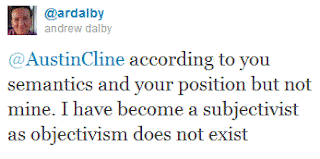The recent
kerfuffle at UCL prompted by overly sensitive religious sentiment has caused a number of folk to say that atheists are bullies, often comparing them to religious fundamentalists. At RichardDawkins.NET there was a rather incoherent poster called
Griswold Grim who made the 'bullying' claim, but he never substantiated it, beyond railing against ridicule.
I witnessed a Twitter spat (which I want to call Twat, but had better not) between P.Z. Myers and a statistician called
Andrew Dalby. P.Z.
had posted a video depicting dreadful intimidation of
Irshad Manji by Muslim fundamentalists, pointing out the deep distinction between militant
theists and militant
atheists. Incredibly, blind to the evidence of his own eyes, Dalby
tweeted this:
Once again, my gast is flabbered by someone in the ongoing debate between believers and non-believers. Displaying breathtaking bigotry against a whole raft of people, Dalby says that P.Z.'s post shows that '
the atheists are just the same sort of bullies as the fundamentalists'. So that post is
the equivalent of instigating a riot, or demanding someone be executed, or demanding that a book be banned. It's a remarkable claim, and Dalby doesn't appear to be a theist, so much as
someone who thinks he's found a way to be superior to both atheists and theists. P.Z. called his lack of critical assessment stupid, to which he replied:
...which made me giggle. Never a good thing to proclaim one's own genius, I find. Or perhaps that's just me, since my inability to 'out intellectual' and 'out science' people has been proved regularly! He followed up with this gem:
That deserves a ROFL. Does he mean lecturers in statistics at Oxford University are automatically correct in any discussion, regardless of the subject? I mean, sure, in a discussion on statistics, P.Z. should probably defer, but in this discussion? It's not clear what relevance this factoid has to Muslim fundamentalism, or handbagging for that matter! Anyway, back to the Twitter spat, and Dalby offers:
So apparently Santayana (and only Santayana?) is foundational to humanist principles? Santayana is all well and good, and wrote much that modern day atheists would agree with, but he was famously sympathetic to Catholicism (presumably because of his background) and few modern day atheists would agree with him on
that score. Of course, many
theist thinkers would disagree with him on that score too! A pointless appeal to bogus philosophical authority, then.
Toleration of religious belief does not entail its
immunity from criticism.
I wasn't sure what had upset Dalby so much about P.Z.'s post, but it became clear in his follow up tweets:
The bit that Dalby does not like appears to be this:
...there might be much to admire in her [Manji's] work, as she’s another theist who has taken a step away from the dogma and tribalism of fundamentalism, but she hasn’t yet had the courage or intellectual integrity to take another step and free herself of the folly of faith.
So the accusation of a lack of courage and intellectual integrity is beyond the Pale, Dalby thinks, and it's wrong to tell people what to believe and that they are inferior or wrong. You will notice that he is pragmatically self-refuting here, since, among other things, he is telling P.Z. it's wrong to tell people they're wrong. Of course it's not, and we would not have morality if it were, since our morals not only guide us in
our behaviour but we also feel they have a
prescriptive effect on others, as Dalby demonstrates. It then becomes clear how this muddle headed thinking arises:
Oh dear; radical scepticism rears its ugly head and we're heading for the barren plains of relativism, where no-one is right and no-one is wrong. Because he's not sure what's true, nothing
is true. This would be a strange philosophy if anyone lived by it, but of course no-one does.
Well, obviously objectivism exists as much as any idea does - he presumably means there is no objective truth. An unsustainable pomo position, as the exchange demonstrates, since his own entreaties would have no weight, if it were true. A tweeter called Austin Cline calls him out:
To which, of course, he has no answer, other than 'thinking is always bad for us'! It's lucky we're not all lecturers in statistics at Oxford University, else none of us would think. The ultimate source of his anger is clear, I think, from this tweet:
If there's one thing that new atheists have achieved, it's a wider acceptance that religion and faith are
not privileged over other beliefs. Folk such as Dalby demonstrate that even many non-believers cling to an unthinking acceptance of this privilege that religion and faith demand.
Of course we tell each other what to think about many things, and there is no good reason to exclude religion and faith from that list of things.
But finally, the outrageous equating of good faith criticism from atheists with genuinely extreme religious bullying has to be called out for the bogus comparison it is. When these sorts of befuddled accusations stop, then it might be that we're getting somewhere in reducing religious privilege.























